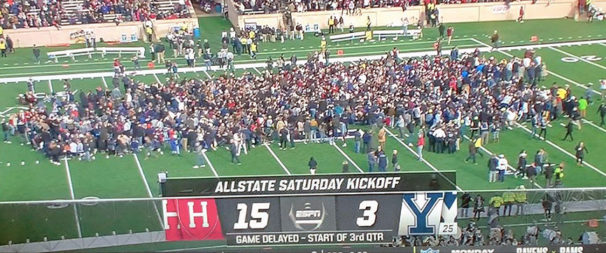
NEW HAVEN — The movement calling on universities to divest from fossil fuels got international attention during the Yale-Harvard football game, as hundreds of spectators left the stands and ran onto the field during halftime in a protest on Nov. 24.
The 136th historic Yale vs. Harvard football game, also known as simply, “The Game,” is the one Ivy League sports event that fills the stands. For a group of 150 Yale and Harvard student activists from Fossil Free Yale, Divest Harvard, and the Yale Endowment Justice Coalition, it was time to bring the call for climate justice to center stage.
In a coordinated effort after the half-time show, activist students, faculty, and alumni from both schools rushed the field and held their ground at the 50-yard line to demand that both Harvard and Yale divest endowment funds from all fossil fuels as well as from Puerto Rican debt holdings that suffocate economic freedom in that country.
Unplanned, hundreds more students piled onto the field in support of the cause with estimates ranging between 500-600 students taking the field. Activists managed to disrupt the game for nearly an hour waving banners stating “Nobody Wins. Yale and Harvard are complicit in climate injustice,” and calling on the presidents of both universities to divest endowment holdings before police eventually retook the field. Charges for disorderly conduct were laid against 42 students.
The two schools combined have a net worth of roughly $71 billion, more than the gross domestic product of 117 nations, per the International Monetary Fund’s 2019 estimates. Harvard has for years refused to pursue divestment strategies from fossil fuels or debt holdings in Puerto Rico. Yale quietly divested $122 million from a fracking company called Antero last winter after 51 activists occupied the lobby of the Yale investments office in December 2018.

A statement released by the student-led coalition’s states: “Students are tired of Harvard and Yale profiting off of climate destruction and neocolonial investments in Puerto Rico’s debt… It’s time for more than lip service and greenwashing from academic leaders. Harvard and Yale must address the climate emergency at the scale and with the urgency it demands. This action is only the beginning.”
While both universities have expressed their disappointment and opposition to the protest, it has received widespread support from the community and high-profile Democratic figures Alexandria Ocasio-Cortez, Bernie Sanders, and Elizabeth Warren.
The Cambridge City Council and the New Haven Board of Alders passed resolutions calling upon the universities to drop all charges and disciplinary action against the students and alumni who took part in the protest.
The 30-member New Haven Board of Alders unanimously voted to “join with the Cambridge City Council in expressing support for the protesters at the 136th edition of The Game for their action to encourage both universities to disclose, divest, and reinvest their holdings in the fossil fuel industry and in Puerto Rican debt.”
The Alders resolution states that “it is true that #NobodyWins until the universities fully disclose, divest, and reinvest their holdings in the fossil fuel industry and in Puerto Rican debt.”
For several days after the game, local media was filled with favorable coverage, including by sports writers.
This marks the first time that any divest movement has disrupted a sporting event, and the first time schools have worked together to coordinate a divestment action. Coupled with the action, students launched a website, NobodyWins2019.com, to connect alumni to the cause by signing the pledge to withhold university donations until divestment has occurred, along with instructions to write letters to the university in support.












Comments